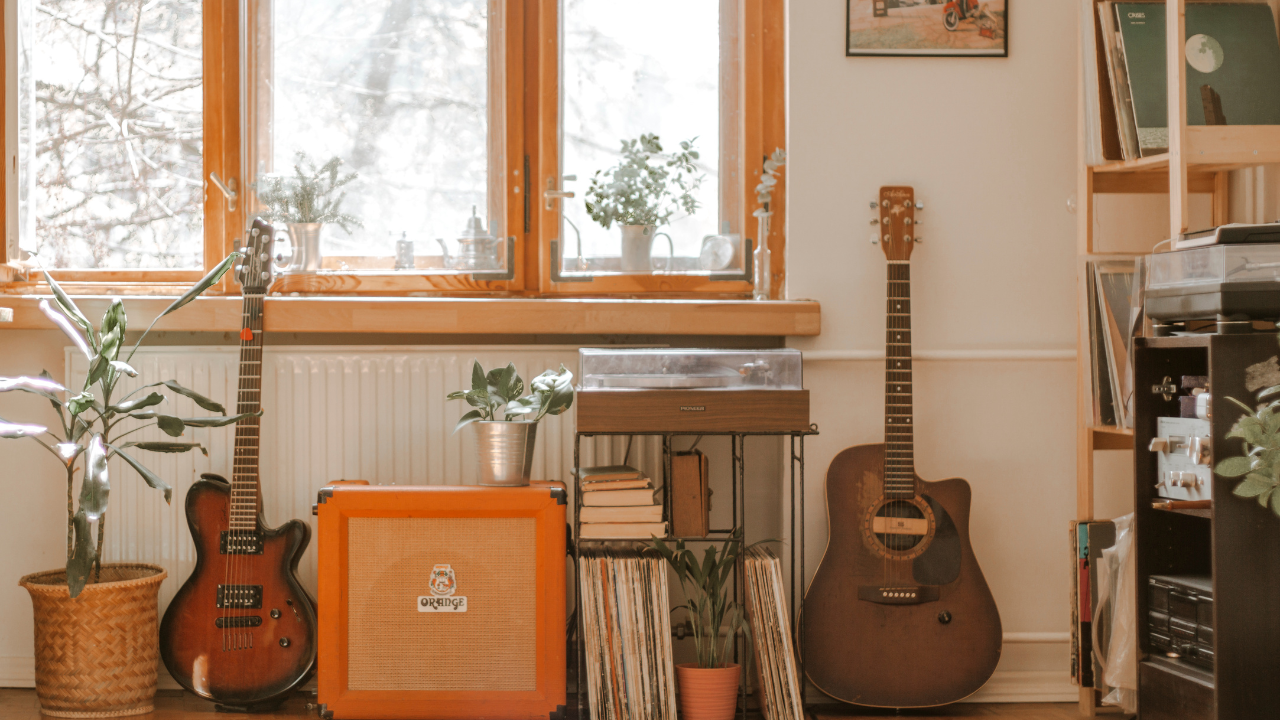
Learning guitar at home is totally doable for any aspiring musician. With the right tools and dedication to daily practice, you can master chords, techniques, and songs from the comfort of your own space.
Online lessons, instructional videos, and guitar learning apps now make it easy and accessible.
All it takes is motivation and consistent practice to become skilled at playing guitar at home.
Can you learn guitar at home?
Yes, it is possible to learn guitar at home! You can become proficient at playing guitar without taking formal lessons or classes with the right dedication and practice.
The key is to have the proper tools and resources. Many excellent guitar lesson books, DVDs, YouTube channels, and online courses provide step-by-step instructions tailored for beginners. Investing in these can give you the foundation you need in guitar basics like proper hand positioning, reading guitar tablature, mastering chords, strumming patterns, and more.
Start with the basics first.
To effectively learn guitar at home, it is crucial to start with the basics. Building a strong foundation is essential for any skill, and playing the guitar is no exception. Begin by familiarizing yourself with the instrument itself and understanding its different parts and functions.
Learn to hold the guitar properly and position your fingers on the fretboard. Focus on mastering fundamental techniques such as picking, strumming, and fretting.
Dedicate time to practicing scales and basic chord progressions to develop finger agility and coordination.
By starting with the basics, you will establish a solid groundwork for your guitar journey, enabling you to progress and explore more advanced techniques and musical concepts in the future.
Utilize online tutorials and resources.
A valuable resource for learning guitar at home is the abundance of online tutorials and resources available. With just a few clicks, aspiring guitarists can access a vast library of instructional videos, articles, and interactive lessons designed to cater to different skill levels and musical interests.
These online tutorials often provide step-by-step guidance on various techniques, chord progressions, and even full-song tutorials.
Many websites offer forums and online communities where learners can connect with fellow guitar enthusiasts, seek advice, and share their progress.
The convenience and accessibility of online tutorials and resources make them an invaluable tool for those embarking on their guitar learning journey from the comfort of their own homes.
Invest in a quality instrument.
Investing in a quality instrument is crucial to fully immerse yourself in the world of guitar playing and maximize your learning potential at home. While it may be tempting to opt for a budget-friendly option, the truth is that the quality of your instrument directly impacts your playing experience and progress.
A well-crafted instrument produces better sound and offers improved playability, responsiveness, and durability. It allows you to develop a deeper connection with the instrument, enhancing your learning journey.
Whether you choose an acoustic or electric guitar, investing in a reputable brand and seeking expert guidance when selecting your instrument will ensure you have a reliable tool that inspires you to practice and achieve your musical goals. Remember, a quality instrument is an investment in your musical future.
Practice consistently and regularly.
Consistency and regularity are paramount when learning the guitar at home. A consistent practice routine helps develop muscle memory, build finger strength, and improve overall proficiency.
Set aside dedicated time each day or week to practice, treating it as a non-negotiable commitment to your musical development. Consistency helps you progress steadily and prevents the loss of skills or knowledge gained.
By practicing regularly, you reinforce and gradually build upon what you have learned, ensuring a solid foundation for continued growth.
Remember, consistently practicing for shorter durations rather than sporadic long sessions is better. Consistency and regularity are key to unlocking your potential and achieving mastery of the guitar in the comfort of your home.
Set achievable goals for yourself.
To maximize your progress and maintain motivation while learning guitar at home, setting achievable goals for yourself is crucial. Setting realistic and attainable goals helps you track your progress, stay focused, and provide a sense of accomplishment as you reach each milestone.
When setting goals, consider your current skill level, available practice time, and the specific areas you want to improve.
Whether mastering a particular chord progression, learning a new technique, or playing a favorite song, breaking down larger goals into smaller, manageable tasks can make the learning process more manageable and enjoyable.
By setting achievable goals and consistently working towards them, you can effectively measure your progress and witness the steady growth of your guitar skills.
Don’t be afraid to make mistakes.
In learning guitar at home, it is important to embrace the idea that making mistakes is acceptable and essential for growth. Mistakes are natural and inevitable, especially when mastering a new skill.
Instead of being afraid of making mistakes, view them as valuable learning opportunities. Each mistake provides insights into areas that need improvement and allows for adjustments.
By experimenting, exploring different techniques, and pushing yourself beyond your comfort zone, you expand your skill set and develop resilience and problem-solving abilities.
Remember, the path to mastery is paved with trial and error, so embrace and learn from your mistakes as you progress on your guitar learning journey.
Seek out virtual lessons or classes.
With the advancement of technology and the accessibility of the internet, seeking out virtual lessons or classes has become a popular and convenient way to learn guitar at home.
Numerous online platforms and websites offer comprehensive guitar lessons that experienced instructors teach.
These virtual lessons often include video tutorials, interactive exercises, and personalized feedback to help you progress your guitar-playing journey.
Learn proper hand positioning and posture.
Developing proper hand positioning and posture is crucial when learning to play the guitar, especially when practicing at home. Maintaining correct hand positioning can optimize your technique, minimize strain on your fingers and wrists, and improve overall playing efficiency.
Positioning your fretting hand so that your fingers are curved and pressing down on the strings with the tips will allow for cleaner and more accurate playing.
Similarly, your picking hand should rest gently on the strings, with the thumb positioned behind the middle and index fingers, providing stability and control.
Paying attention to your hand positioning and posture from the beginning will enhance your playing abilities and prevent potential injuries or discomfort in the long run.
It is recommended to consult expert resources or online tutorials to ensure you practice and maintain proper hand positioning and posture throughout your guitar learning journey.
Experiment with different styles and techniques
To truly excel in playing the guitar at home, it is essential to experiment with different styles and techniques.
This allows you to expand your musical repertoire and discover new ways to express yourself through the instrument. Whether it’s exploring different genres like blues, rock, or jazz or incorporating techniques such as fingerpicking, slides, or bends, stepping outside of your comfort zone will undoubtedly enhance your skills and creativity.
By immersing yourself in diverse styles and techniques, you broaden your musical horizons and develop a unique playing style that sets you apart as a guitarist. Embrace the opportunity to explore and challenge yourself, as it is through experimentation that you uncover your true potential as a musician.
Don’t give up; keep strumming on.
In learning guitar at home, there may be moments of frustration and self-doubt. However, it is crucial to remember that progress takes time and dedication. Keep pursuing your dreams of becoming a skilled guitarist. Keep strumming on, even when faced with difficulties or setbacks.
You step closer to achieving your musical goals every time you pick up the guitar. Embrace the challenges as opportunities for growth; with persistence and practice, you will begin to see improvement.
Surround yourself with inspiration, seek guidance from experienced musicians, and find joy in learning. Remember, the path to mastery is paved with determination and a belief in your abilities. So, don’t let obstacles discourage you.
Keep strumming on, and you will unlock the beautiful melodies at your fingertips.
Conclusion
In conclusion, while learning guitar at home may differ from the traditional method, it is a viable and effective way to become a skilled musician. With the abundance of online resources, virtual lessons, and self-teaching materials, anyone can learn and improve their guitar skills from their home. While it may require discipline and dedication, the satisfaction of mastering a new skill on your own is invaluable.
So, if you’ve been considering picking up the guitar, don’t let the idea of learning at home hold you back – with determination and perseverance, you can achieve your musical goals.
FAQ
What are some effective methods or resources for learning guitar at home?
Some effective methods and resources for learning guitar at home include online tutorials and lessons, instructional books or eBooks, video lessons, guitar apps, and interactive learning platforms. These resources provide step-by-step guidance, chord diagrams, exercises, and practice routines to help beginners learn the basics and progress in their playing.
Online communities and forums also offer support and feedback from fellow guitarists. Consistency, practice, and patience are key to mastering the guitar at home, setting specific goals, and gradually increasing difficulty levels.
Can someone with no prior musical experience learn to play guitar at home?
Yes, someone with no prior musical experience can learn to play guitar at home. With abundant online resources such as video tutorials, instructional websites, and mobile applications, learning to play guitar has become more accessible than ever.
What are the advantages and disadvantages of learning guitar at home compared to formal lessons?
Learning guitar at home offers convenience and flexibility as you can learn at your own pace and schedule. It also allows for self-guided exploration and creativity.
How long does it typically take to learn guitar at home and reach proficiency?
The time it takes to learn guitar and reach a proficient level at home can vary widely depending on various factors such as the individual’s dedication, practice routine, prior musical experience, and natural aptitude.
Are there any specific challenges or obstacles individuals may face when learning guitar at home, and how can they be overcome?
Yes, there are several challenges that individuals may face when trying to learn guitar at home. One challenge is a lack of motivation and accountability, as it can be easy to lose focus without a teacher or structured lessons.






